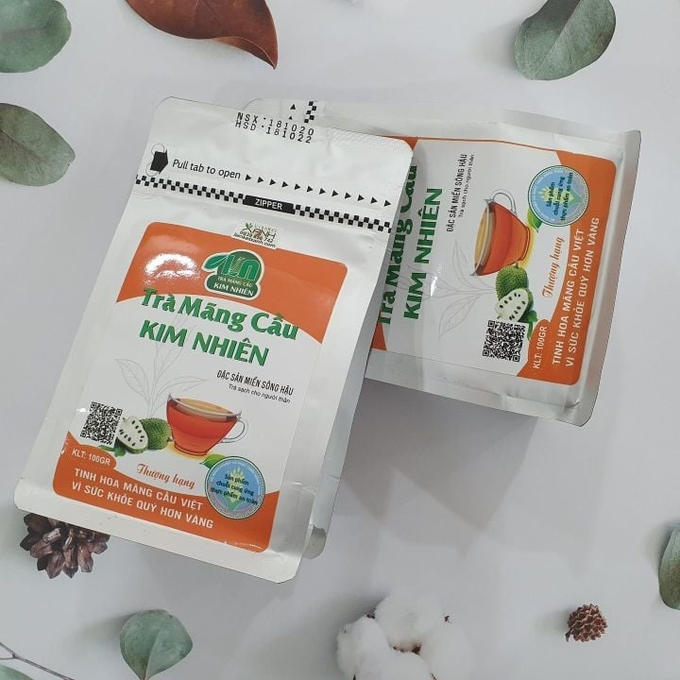May 30, 2025 | 00:13 GMT +7
May 30, 2025 | 00:13 GMT +7
Hotline: 0913.378.918
May 30, 2025 | 00:13 GMT +7
Hotline: 0913.378.918
Through recording opinions from many customer objects as well as OCOP product trading points, it can be seen that OCOP products in Can Tho city are very diverse in packaging with much more outstanding design. However, in order to create output for OCOP products, it is necessary to focus on both product quality and packaging design. Therefore, to further develop OCOP products, Can Tho city’s agriculture sector provided support for OCOP subjects to improve the quality of their products.

OCOP products in Can Tho city are very diverse in packaging, with much more outstanding design. Photo: ST.
Participating in the Talkshow of the Vietnam Agriculture Newspaper, Mr. Tran Thai Nghiem, Deputy Director of the Can Tho Department of Agriculture and Rural Development, shared that “Creating conditions for OCOP subjects to improve the quality of their products is not only the wish of subjects and the agriculture sector but also the wish of everyone in Can Tho city.”
According to Mr. Tran Thai Nghiem, to do this, right from the beginning, when subjects had the idea of building and developing OCOP products, the agriculture sector also assigned relevant units to support subjects in dossier procedures and quality certification to serve as a basis for announcing quality standards, supporting traceability with QR codes, etc.
Besides, through the practice of many products certified 3 or 4 stars, the city’s agriculture sector realized that in order for subjects to have conditions to improve product quality, right from the raw material area, areas must be formed to ensure quality and sustainable production conditions, like the story of Ms. Nguyen Kim Nhien with the “Kim Nhien custard apple tea” brand.
At the same time, it is also necessary to build product stories, stories from production raw material areas, and cultural values contained in those products to create an attraction for OCOP products. However, these stories or values must be associated with agricultural tourism programs.

Mr. Tran Thai Nghiem and Ms. Nguyen Kim Nhien participated in the Talkshow of the Vietnam Agriculture Newspaper. Photo: VAN.
It can be seen that subjects had many advantages in developing OCOP products in Can Tho city, such as large potential and strengths to expand product output, right and prompt support and orientations from the city’s agriculture sector, etc. However, there is no shortage of difficulties that still exist and need to be resolved.
As a subject with 4-star OCOP custard apple tea, Ms. Nguyen Kim Nhien, Director of Kim Nhien Agricultural Product Processing Company, shared the company’s practical difficulties. “At present, not only our company but also many owners of other OCOP products are also facing difficulties. The products not only cannot be exported but also cannot be widely consumed in the domestic market,” she said.
That is because nowadays, customers cannot distinguish OCOP products sold on the market that are completely different from normal products, so they equate the quality. Thereby, it is very difficult to sell OCOP products at small focal points.

Not only the Kim Nhien company but also many owners of other OCOP products are also facing difficulties in developing OCOP products. Photo: VAN.
In addition, OCOP products on the market from localities are now growing massively in terms of quality, small-scale, and fragmented. The production process is not diverse and modern, with manual machinery. As a result, the products cannot be sold at supermarkets and are not accepted by large supermarkets in terms of product quality and packaging design.
Facing these above-mentioned difficulties in product output, Kim Nhien Company as well as other OCOP entities wish to receive support from the city’s agriculture sector in trade promotion, introducing OCOP products in strategic fair programs, and signing friendly cooperation agreements between units with memoranda of understanding. This helps their products spread to more markets. Thereby, the market for OCOP products in Can Tho city will be wider, and more products can be exported.
Responding to the wishes of OCOP subjects, the representative of Can Tho city’s agriculture sector shared the unit’s development support orientations to help the subjects solve difficulties.

Mr. Tran Thai Nghiem shared the agriculture sector’s development support orientations to help OCOP subjects. Photo: VAN.
In recent times, the agriculture sector has issued a policy to support connections between subjects and tourist attractions, restaurants, and hotels. This is one of the solutions that requires few resources, and the city also finds initial signs of effectiveness.
Currently, the agriculture sector is also researching ways to connect with some organizations to develop a program on supporting solutions of digital technology applications, such as livestream sales through technology platforms to help subjects proactively introduce their products, product stories, and culture of specific products and regions; digital platform, digital technology, and linkage applications to improve product quality; and the e-commerce platform application.
“Recently, OCOP subjects have also put products on e-commerce platforms, but the stories and livestream solutions are not methodical. The agriculture sector in the current period is also developing some contents to jointly support OCOP products to associate with raw material areas certified with standards and quality to confirm the quality of products, contribute to affirming the product’s reputation, and further promote the product,” said Mr. Tran Thai Nghiem.
Can Tho city is now also developing a project for a center to link production, processing, and consumption of agricultural products in the Mekong Delta region. It is also expected that this center will attract many investors who are businesses and organizations with modern material facilities, great potential, strategic investment, and technology application to serve as a basis for spreading technical and technological solutions to help not only OCOP subjects but also the Mekong Delta agriculture sector.
Translated by Huyen Vu Thu
/2025/05/25/4127-3-073637_820.jpg)
(VAN) Thanks to the promotion from an FAO-implemented project, vegetable production in greenhouses in Moc Chau has seen strong development, from 1.5 hectares in 2021 to nearly 50 hectares in 2024.

(VAN) FAO has recently supported USD 140,000 to implement the project 'Risk mitigation human-animal interface risks through disease control initiatives in pig farming.'

(VAN) The People's Committee of Tra Vinh province has approved an adjustment to the investment policy for the Green Hydrogen Plant project, increasing its area to approximately 52.76 hectares.
![Reducing emissions from rice fields: [2] Farmers’ commitment to the soil](https://t.ex-cdn.com/nongnghiepmoitruong.vn/608w/files/news/2025/05/05/dsc08881jpg-nongnghiep-140632.jpg)
(VAN) Clean rice cultivation model in Thuong Tan commune, Bac Tan Uyen district, is assisting local residents in achieving sustainable agriculture by substantially reducing costs, increasing productivity, and protecting the environment.

(VAN) At the conference to disseminate Resolution No. 68, AgriS introduced its digital agricultural ecosystem and reaffirmed its commitment to accompanying the Government in promoting private sector development and sustainable agriculture.

(VAN) 'Blue Ocean - Blue Foods' initiative is designed to restore marine ecosystems and establish sustainable livelihoods for local communities by cultivating a minimum of 1,000 hectares of cottonii seaweed in the first three years.
/2025/05/21/4642-3-112707_603.jpg)
(VAN) The V-SCOPE project has made direct contributions to three out of six pillars of the Comprehensive Strategic Partnership between Vietnam and Australia.